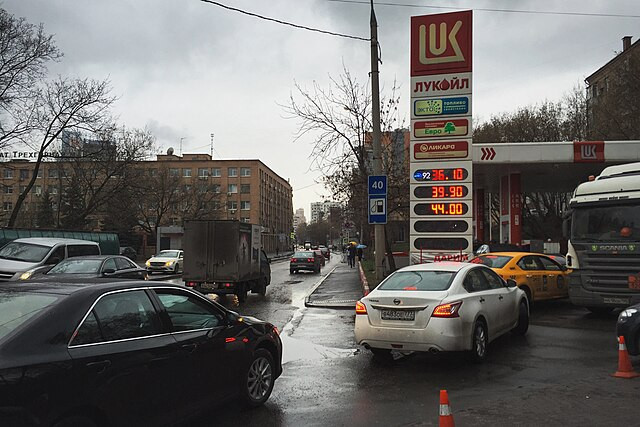Russia is facing acute fuel shortages and soaring gasoline prices after a wave of Ukrainian drone attacks on oil refineries and energy facilities disrupted production and deliveries across several regions. The strikes, which intensified in August, have left motorists in Crimea and Russia's Far East waiting in long lines or finding gas stations shuttered, with some areas resorting to rationing or cutting off sales entirely.
On the St. Petersburg International Mercantile Exchange, wholesale prices for A-95 gasoline rose to record highs last week, nearly 50% above January levels. Russian media reported that in the Primorye region near North Korea, drivers were paying about 78 rubles per liter-$3.58 a gallon-while others turned to online resales at prices as high as 220 rubles per liter, or about $10.12 a gallon. The surge comes as farmers intensify harvest operations and vacationers hit the roads for the end of summer holidays.
Local shortages have become severe in some areas. Officials in the Kurilsky district of the Kuril Islands north of Japan halted public sales of A-92 gasoline on Monday. In Crimea, a resort region annexed by Russia in 2014, companies restricted fuel purchases to holders of coupons or special cards. Sergei Aksyonov, the Russian-appointed head of Crimea, acknowledged on state television: "Unfortunately, some petrol stations in Crimea are currently experiencing shortages of certain types of fuel. This is due to both a decrease in production volumes and logistics, a significant portion is delivered to the region by road. This is an objective situation, which could last for up to a month or more."
The impact is not evenly felt across the country. Moscow has avoided significant shortages because of steady supplies from nearby refineries in Yaroslavl, Nizhny Novgorod, and the capital itself. But the latest disruptions are straining Russia's wider domestic market. According to Energy Intelligence analyst Gary Peach, refinery intake has dropped by 200,000 to 250,000 barrels a day. "That's just enough to make their gasoline industry feel some pain, especially during the high consumption months in the summer," he said.
Ukraine has escalated long-range drone operations, reportedly knocking out about 13% of Russia's refining capacity this month. Sergey Vakulenko, a senior fellow at the Carnegie Russia Eurasia Center, told the Associated Press: "The Ukrainians are attacking an arc of refineries, starting from Ryazan, which is south of Moscow, all the way to Volgograd. That region is where people are driving through on their way to (resorts on) the Black Sea. That's the region where most of the harvest operations are going on. And that's also a rather densely populated region."
Between August 2 and August 24, Ukraine struck Russian oil infrastructure at least 12 times, with 10 of those attacks targeting sites in the Ryazan-Volgograd corridor. Jenny Mathers, senior lecturer in international politics at Aberystwyth University, said the strikes are designed to undermine Moscow's war effort. "Energy is Russia's number one export by a long way, so keeping those exports flowing is an important way for Russia to continue to pursue the war the way it's been pursuing it," she told Reuters. "Ukraine, obviously knowing that, has made targeting the facilities one of its high priorities, so it has developed over the past months the ability to strike targets quite deep inside Russia."
The shortages are compounded by logistical and economic pressures. Inflation has discouraged independent suppliers from stockpiling gasoline earlier in the year, while repeated strikes on transportation networks have pushed more Russians onto the roads, raising demand. Russia has paused gasoline exports since late July in an effort to shore up domestic supply, with the Energy Ministry signaling restrictions could extend into September.
Residents in affected regions describe the strain on household budgets. "We will endure, but this is a big hit to our family budget, it's a big hit. It's really noticeable," said Svetlana Bazhanova of Sevastopol, Crimea, in an interview with Reuters. Ukraine's foreign intelligence service has reported strict rationing in the remote Kuril Islands, saying Russia has prioritized exports to maintain revenue despite domestic scarcity.
Ukraine has also expanded its campaign beyond refineries, striking a key pumping station on the Druzhba oil pipeline that supplies Russian crude to Hungary and Slovakia, the only EU states still receiving pipeline oil from Moscow. Hungarian Prime Minister Viktor Orban said in a letter to President Donald Trump that the move was a "very unfortunate" escalation, releasing what appeared to be Trump's handwritten response: "Viktor, I do not like hearing this, I am very angry about it." The White House has not commented.






